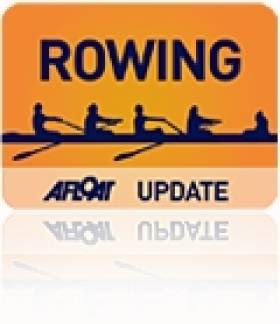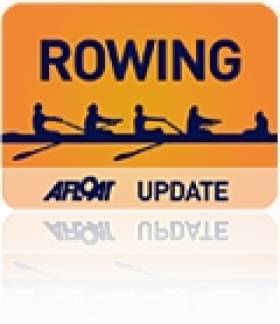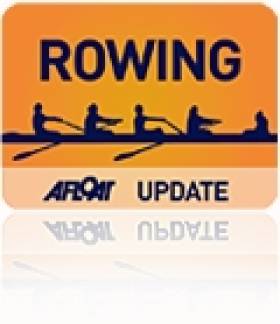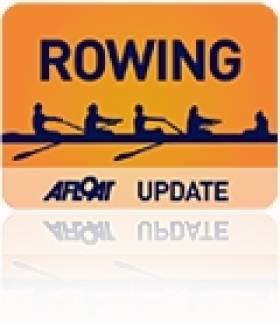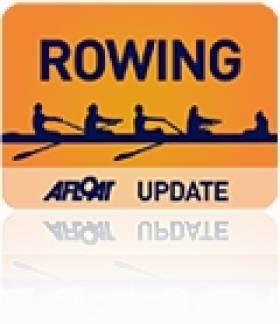Displaying items by tag: Belgrade,
#ROWING: Ireland's Sanita Puspure fought her way into the A Final of the single scull at the World Cup in Belgrade this afternoon. With Xiuyun Zhang and world champion Mirka Knapkova colonising the first two places, it became a race between Puspure and Kaisa Pajusalu for the crucial third qualifying spot. A push in the third quarter was decisive for Puspure, who held off a late challenge from Pajusalu and had almost five seconds to spare on the line. Pajusalu, a former world champion at under-23 level, was 12th in the world last year in this class.
World Cup, Belgrade – Day Two (Irish interest)
Men
Lightweight Double Scull – C Final (places 13 to 18): 1 Austria Two 6:24.17, 2 Austria Three 6:24.21, 3 Slovenia Two 6:26.16, 4 Croatia 6:26.66, 5 Ireland (M O’Donovan, N Kenny) 6:26.67, 6 Austria One 6:27.57.
Lightweight Single – C Final: Ireland (M Maher) did not start.
Women
Single Scull – A/B Semi-Final (First Three to A Final; rest to B Final): 1 China (X Zhang) 7:18.59, 2 Czech Republic (M Knapkova) 7:18.81, 3 Ireland (S Puspure) 7:27.27; 4 Estonia (K Pajusalu) 7:32.15, 5 Serbia Two (I Filipovic) 7:43.16, 6 Ukraine (N Huba) 7:48.97.
Lightweight Single Scull – Repechage (First Four to A/B Semi-Final): 1 Switzerland (P Weisshaupt) 7:55.81, 2 Ireland (C Lambe) 7:57.35, 3 Sweden One (C Lilja) 7:58.63, 4 Croatia (H Pavkovic) 8:01.57; 5 Sweden Two (L Kalstroem) 8:06.42.
Dramatic Finish in Ireland Race at World Cup Rowing
#ROWING: In a race with a dramatic finish, Ireland’s lightweight double of Mark O’Donovan and Niall Kenny finished fifth in the C Final of the lightweight men’s double at the World Cup Regatta in Belgrade this morning. This placed them 17th overall.
The Ireland crew held third behind two Austrian doubles until a final charge by Slovenia and surprise packets Croatia saw both boats pass them. Croatia were just one hundredth of a second ahead of the Irish on the line.
Michael Maher did not start his C Final in the men’s lightweight single scull.
World Cup, Belgrade – Day Two (Irish interest)
Men
Lightweight Double Scull – C Final (places 13 to 18): 1 Austria Two 6:24.17, 2 Austria Three 6:24.21, 3 Slovenia Two 6:26.16, 4 Croatia 6:26.66, 5 Ireland (M O’Donovan, N Kenny) 6:26.67, 6 Austria One 6:27.57.
Lightweight Single – C Final: Ireland (M Maher) did not start.
Women
Lightweight Single Scull – Repechage (First Four to A/B Semi-Final): 1 Switzerland (P Weisshaupt) 7:55.81, 2 Ireland (C Lambe) 7:57.35, 3 Sweden One (C Lilja) 7:58.63, 4 Croatia (H Pavkovic) 8:01.57; 5 Sweden Two (L Kalstroem) 8:06.42.
Lambe Secures A Final Place at World Cup Rowing
#ROWING: Claire Lambe competed well to finish second in her repechage this morning and qualify for this afternoon’s A Final of the lightweight single scull at the World Cup Regatta in Belgrade. The 21-year-old Dubliner was always in the thick of the action and led in the closing stages before she was passed by Pamela Weisshaupt of Switzerland in the final 250 metres. Weisshaupt (33) was world champion in this discipline in 2008 and 2009 and silver medallist last year.
World Cup, Belgrade – Day Two (Irish interest)
Women
Lightweight Single Scull – Repechage (First Four to A/B Semi-Final): 1 Switzerland (P Weisshaupt) 7:55.81, 2 Ireland (C Lambe) 7:57.35, 3 Sweden One (C Lilja) 7:58.63, 4 Croatia (H Pavkovic) 8:01.57; 5 Sweden Two (L Kalstroem) 8:06.42.
O'Donovan and Kenny Miss Out at World Cup
#ROWING: Ireland’s lightweight double scull of Mark O’Donovan and Niall Kenny did not make it into the A/B Semi-Finals at the World Cup regatta in Belgrade today. In a close-fought repechage, where two places were available, Ireland were in contention at half way, but in a hectic second 1,000 metres they fell back as Cuba and the Czech Republic took the qualification places.
Michael Maher also had a disappointing repechage in the lightweight single scull. He finished sixth, well outside the A/B Semi-Final places.
World Cup Regatta, Belgrade – Day One (Irish interest)
Men
Lightweight Four – Heat Two (First Directly to A Final): 1 Britain (P Chambers, R Williams, R Chambers, C Bartley) 5:52.30.
Single Scull – Heat Two (Winner to A/B Semi-Final): 1 Britain (A Campbell) 6:57.43.
Lightweight Double Scull – Heat Four (Winner to A/B Semi-Finals; rest to Repechages): 1 China (C Wu, F Zhang) 6:22.40, 2 Greece 6:26.19, 3 Austria Four 6:32.40, 4 Ireland (M O’Donovan, N Kenny) 6:32.96, 5 Austria Two 6:37.47. Repechage (First Two to A/B Semi-Finals): 1 Cuba 6:25.96, 2 Czech Republic 6:26.89; 3 Slovenia Two 6:27.15, 4 Ireland 6:30.89, 5 Sweden 6:36.06.
Lightweight Single Scull – Heat One (First Three to A/B Semi-Final; rest to Repechage): 1 France Two 7:07.89, 2 Norway Three 7:11.01, 3 Greece 7:11.15, 4 Egypt 7:18.82, 5 Ireland (M Maher) 7:24.05. Repechage (First Three to A/B Semi-Finals) 1 Italy 7:08.05; 6 Ireland 7:30.00.
Women
Single Scull – Heat Three (First Two Directly to A/B Semi-Finals; rest to repechages): 1 Serbia (I Obradovic) 7:29.83, 2 Ireland (S Puspure) 7:34.28; 3 Norway (T Gjoertz) 7:34.70, 4 Lithuania (D Vistartaite) 7:58.31, 5 Austria (L Farthofer) 8:01.66.
Lightweight Single Scull – Heat One (Winner to A Final; rest to Repechage): 1 Britain (K Twyman) 7:49.69; 2 Ireland (C Lambe) 7:54.91, 3 Austria Two 8:00.09, 4 Croatia 8:00.85.
#ROWING: Sanita Puspure was Ireland's success story on the first day of the World Cup Regatta in Belgrade today. She won a battle with Norway’s Tale Gjoertz to finish second behind local woman Iva Obradovic in her heat and qualify directly for the A/B Semi-Final of the single scull.
The three other Ireland crews in action all face into repechages. Mark O’Donovan and Niall Kenny finished fourth in their heat of the lightweight double sculls, over 10 seconds behind the winners, China. In the lightweight single sculls, Michael Maher finished fifth in his heat and Claire Lambe second in hers.
World Cup Regatta, Belgrade – Day One (Irish interest)
Men
Single Scull – Heat Two (Winner to A/B Semi-Final): 1 Britain (A Campbell) 6:57.43.
Lightweight Double Scull – Heat Four (Winner to A/B Semi-Finals; rest to Repechages): 1 China (C Wu, F Zhang) 6:22.40, 2 Greece 6:26.19, 3 Austria Four 6:32.40, 4 Ireland (M O’Donovan, N Kenny) 6:32.96, 5 Austria Two 6:37.47.
Lightweight Single Scull – Heat One (First Three to A/B Semi-Final; rest to Repechage): 1 France Two 7:07.89, 2 Norway Three 7:11.01, 3 Greece 7:11.15, 4 Egypt 7:18.82, 5 Ireland (M Maher) 7:24.05.
Women
Single Scull – Heat Three (First Two Directly to A/B Semi-Finals; rest to repechages): 1 Serbia (I Obradovic) 7:29.83, 2 Ireland (S Puspure) 7:34.28; 3 Norway (T Gjoertz) 7:34.70, 4 Lithuania (D Vistartaite) 7:58.31, 5 Austria (L Farthofer) 8:01.66.
Lightweight Single Scull – Heat One (Winner to A Final; rest to Repechage): 1 Britain (K Twyman) 7:49.69; 2 Ireland (C Lambe) 7:54.91, 3 Austria Two 8:00.09, 4 Croatia 8:00.85.


























